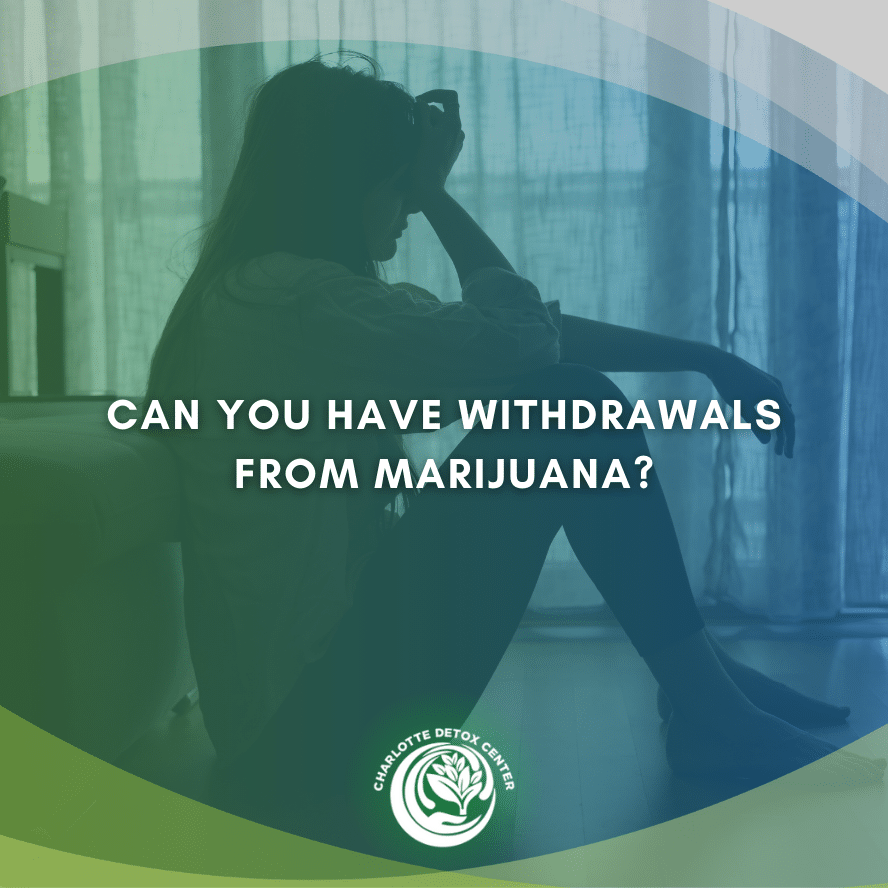Can You Have Withdrawals From Marijuana?

Medically Verified: 2/1/24
Medical Reviewer
Chief Editor

All of the information on this page has been reviewed and verified by a certified addiction professional.
In recent years, the attitude towards marijuana has changed drastically. While the drug is being legalized both medicinally and recreationally in many states, the abuse of this substance is becoming even more common than before. According to the CDC, marijuana is the most commonly abused drug with 48.2 million Americans using it in 2019.[1]
Because of the legalization of this substance, many people believe that it is harmless, but many people overuse this drug. The CDC reports that 3 in 10 people who use marijuana are addicted to the substance.[1]
Since people can become addicted to weed, they can also experience symptoms of withdrawal when they abruptly stop using the drug. Marijuana withdrawal can be more intense in some people than in others.
Can You Get Addicted to Marijuana?
Many people who begin using marijuana start smoking the substance every day. This is how addiction begins. As they smoke the substance daily, their system becomes accustomed to the presence of THC–the main psychoactive ingredient found in weed.
The National Institute on Drug Abuse reports that 30% of individuals who use marijuana are addicted. People who begin using this drug before the age of 18 are four to seven times more likely to suffer from a marijuana use disorder.[2]
Marijuana use disorder becomes an addiction when the person cannot stop using the drug even though it is interfering with aspects of their life. For example, many people find that weed lowers their motivation levels, rendering them unable to complete important tasks when they are under the influence. While they are aware of the consequences of their marijuana abuse, they are unable to stop using the substance because they have become addicted.
The Symptoms of Marijuana Withdrawal
When someone is addicted to marijuana, they will experience symptoms of withdrawal if they stop using the substance abruptly. This occurs because their body is having a hard time adjusting to the absence of THC. The symptoms of marijuana withdrawal can range from mild to severe, depending on how often or how heavily an individual smoked the substance.
The symptoms of marijuana withdrawal may include:
- Loss of appetite
- Changes in mood
- Irritability
- Insomnia
- Headaches
- Inability to focus
- Cravings for marijuana
- Excessive sweating and night sweats
- Chills
- Increased symptoms of anxiety or depression
- Stomach problems
While the symptoms of marijuana withdrawal are not life-threatening, they can be distressing, causing them to use weed to soothe their ailments which continues the cycle of addiction even further.
Instead, a medical detox center can provide patients with the medical care they need. In one of these programs, medications will be dispensed to soothe the symptoms of withdrawal, preventing patients from relapsing.
Marijuana Withdrawal Timeline
The timeline for withdrawal varies from person to person, as each individual used marijuana differently. For example, someone who had a mild marijuana use disorder may experience withdrawal only for a short time, while a person with a severe addiction to the drug will experience prolonged withdrawal symptoms. However, there is a general timeline that marijuana withdrawal typically follows.
The marijuana withdrawal timeline that is to be expected includes:
- Symptoms beginning within a week of discontinuation
- Peak symptoms begin within 10 days of discontinuation
- After the symptoms peak, they begin to decline in severity over 10-20 days
Some individuals may experience symptoms past the normal timeline. These symptoms may include lethargy, mild depression, mood swings, issues with motivation, and intermittent cravings for marijuana. Symptoms can last for days, weeks, and even months after they stopped using the drug.
While marijuana withdrawal is not life-threatening, some people may experience mental health symptoms. For example, someone could experience extremely poor judgment, be prone to accidents, or develop suicidal thoughts as a result of the depression associated with withdrawal. As a result, the safest way to detox is to do so under medical supervision.
How Is Marijuana Withdrawal Treated?
Marijuana withdrawal is treated within the safety of a professional medical detox center. Detox centers use medications to lessen symptoms and make patients more comfortable throughout the process.
Several medications may be used to soothe the symptoms of marijuana withdrawal. These include:
- Ambien – helps treat insomnia
- BuSpar – reduces irritability and anxiety
- Neurontin – also helps with sleep difficulties
- FAAH inhibitors – may help break down the ingredients of cannabis in the system, however, clinical trials are still underway
- Allosteric modulators – helpful in reducing cravings for marijuana
In addition to medications, patients will undergo group therapy and individual therapy as well as participate in self-help groups. This allows them to begin recovering from the causes and effects of their addiction to cannabis, rather than only treating the physical symptoms of withdrawal.
Once someone completes a marijuana detox program, they will have the option to attend inpatient or outpatient treatment. These programs place a greater emphasis on mental health care, trauma recovery, and helping the patient adjust to a sober life.
Finding Help for Marijuana Addiction and Withdrawal
If you or a loved one suffer from marijuana addiction, it’s time to seek help. While many people believe that this substance is harmless, the withdrawal process can be uncomfortable and distressing, but professional treatment can help.
Our compassionate team of clinicians at Charlotte Detox Center understands how vital the detoxification process is to your recovery. We offer comprehensive treatment plans and a small patient-to-staff ratio to ensure that you are as comfortable and safe as possible. Our detox facility is staffed with clinicians, doctors, counselors, and recovery coaches that are here to offer around-the-clock monitoring and support every step of the way.
Contact Charlotte Detox Center today to get started.
References:
